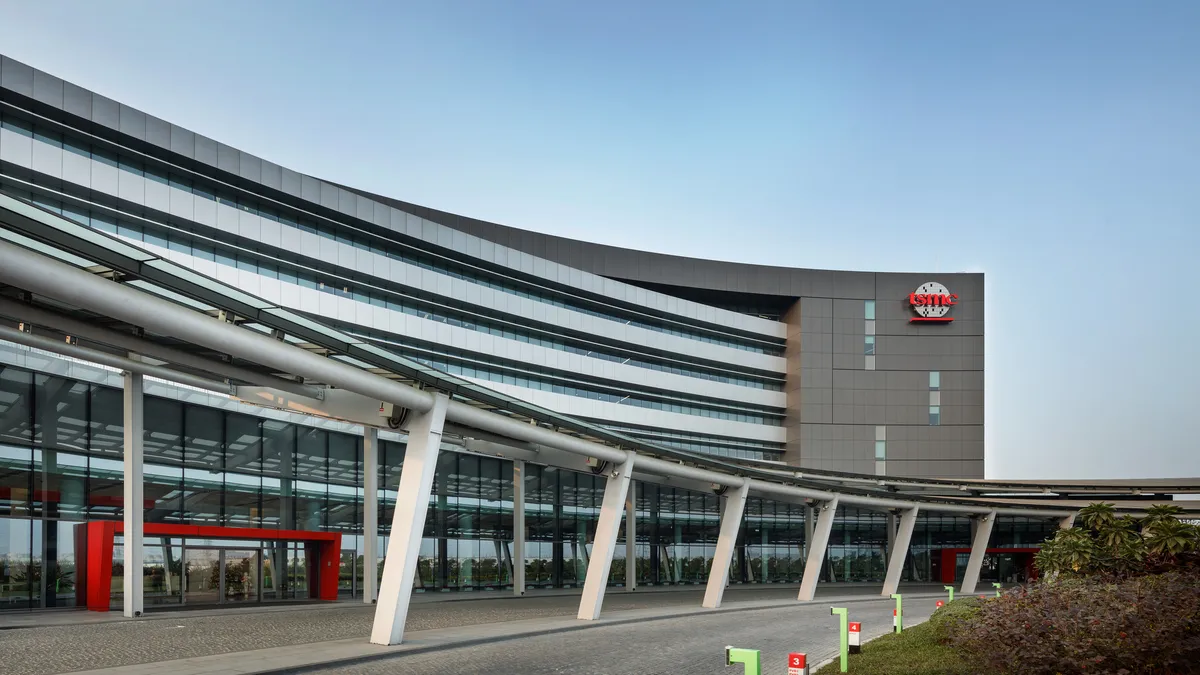Dive Brief:
- The Taiwan Semiconductor Manufacturing Company expects the shortage of automotive components that rely on its semiconductors will be "greatly reduced" by the next quarter and it plans to invest $100 billion over three years to increase its capacity, CEO C.C. Wei said on the company's earnings call Thursday.
- Wei later added the overall shortage could still stretch into 2022 despite investments. TSMC has been working since January to reallocate wafer manufacturing capacity to support the auto industry, but it can take six months for components to work their way through the tiers of suppliers to get to the final vehicle producer.
- "Amidst the lingering macro and supply uncertainties, we expect our customers and the supply chain to gradually prepare higher levels of inventory throughout the year as compared to the historical seasonal level," CFO Wendell Huang said on the call, talking about overall demand. "We expect this to persist for a period of time given the industry's continued need to ensure supply security."
Dive Insight:
It has been a turbulent year for semiconductors, and TSMC is working to keep up with high levels of demand through sectors like high-performance computing, smartphones and automotive.
Automotive customers have sent a lot of mixed messages to TSMC since the beginning of the pandemic, slashing orders with the supplier when it first hit in March 2020, only to ramp up orders again when demand returned stronger than expected.
"The automotive supply chain was affected throughout the year, and our customers continued to reduce their demand throughout the third quarter of 2020," Wei said. "We only began to see sudden recovery in the fourth quarter of 2020."
Automotive customers increased orders at the same time other markets also faced high demand. Stimulus money and working from home have driven sales for items like gaming systems and computers, experts said. The demand underscores how the pandemic has accelerated digital transformation, Wei said, and TSMC faced challenges keeping up.
The winter storm in Texas also impacted production. And now a drought in Taiwan threatens the water-intensive wafer manufacturing process, though TSMC executives are confident there won't be a significant effect.
"We will continue our collaborative effort with the government and the private sector on water conservation and new water sources," Wei said. "With our comprehensive enterprise risk management system, we do not expect to see any material impact to our operations."
Semiconductors have been listed as a commodity in short supply for the last four months and its been listed as increasing in price for the last two months on the Institute for Supply Management's manufacturing report.
TSMC expects its capacity to remain tight through the remainder of the year, Huang said. But it pointed to investments to ensure that supply turns around.
"We have acquired land and equipment and started the construction of new facilities," Wei said. "We are hiring thousand of employees and expanding our capacity at multiple sites."
And some of this capacity is expected to be in the U.S. Wei said the company is still planning to build its new factory in Arizona.
Automotive manufacturers have struggled with production in recent months as TSMC and other producers work to spin up extra capacity. In a letter to the Biden administration, the Alliance for Automotive Innovation called on the government to help expand production in the U.S.
General Motors, Ford and Stellantis have all had to delay or shift production as a result of the semiconductor shortage. Paccar said the shortage led to a 3,000 vehicle reduction in truck deliveries in Q1.
An analysis by S&P shows that General Motors' production cuts have resulted in the company's imports dropping 66.4% YoY in January, which it said are "levels not seen since the pandemic-linked closures in the second quarter of 2020."














